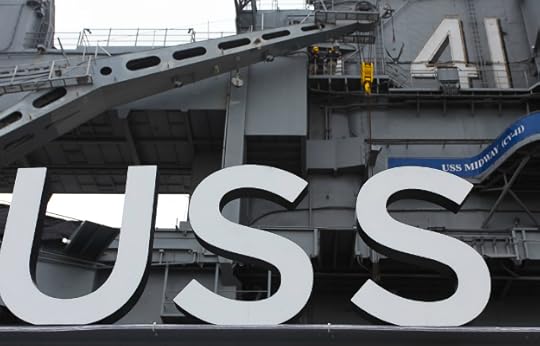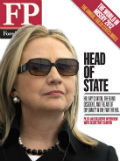Thomas E. Ricks's Blog, page 176
June 20, 2012
41 years in the Marines

I didn't know it was possible, but Col.
Wayne Steele has served in the Marine Corps for 41 years. Now 61 years old,
he is deployed to Afghanistan. He's been a gunnery sergeant and a CWO5 and, for
the last 30 years, an officer. One of his sons will retire from the Army before
he retires from the Marines.
It reminds me of the time I saw an old soldier wearing an
American combat patch in Baghdad. But he had broken time.
June 19, 2012
Zakheim: The Prophet Isaiah was right about the strategic situation in the ancient Mideast -- and it isn't much different now

Remember my ruminating a couple of weeks ago about
whether our
strategic culture was shaped in part by the Old Testament?
Turns out someone who actually knows what he is
talking about when he discusses the Bible is thinking about the
strategic implications of the situation of Israel described in that
book. In the new issue of The American
Interest, former Pentagon comptroller Dov Zakheim finds parallels between
Israel's current strategic situation and that described in the Bible. He
predicts that:
"Israel could indeed
find itself in a general situation paralleling that of its Biblical
predecessors: without a geographically remote ally, and in a region no longer
tightly tethered to and constrained by an extrinsic great power rivalry. Like
its Biblical predecessors, Israel may be forced to confront its place in
shifting local power balances among states that might be at times friendly and
at other times hostile. It may also have to weigh alliances with and against
powers more geographically proximate: Turkey, Iran, India, perhaps Pakistan (if
it survives as a state) and even China."
Zakheim also is interesting
in his discussion of the politics of the prophets: "The
Prophets were consummate realists: Isaiah preached independent neutrality when
it was appropriate; Jeremiah preached submission to the superpower when the
external ‘correlation of forces' had changed."
The lesson for Israel he finds in the words of
the prophets is this: "Realism in foreign policy, moderation
in religious policy, openness in economic policy and equality in social policy
may be the best path for the Jewish state as it confronts its uncertain
future."
The collapse of NDU: A view from inside

By “A. Puzzled Prof”
Best Defense guest columnist
I read your piece
on the resignation of Hans Binnendijk, the head research guru of the National Defense University and
one of America's leading strategic thinkers. It comes amidst much turmoil
imposed on the university from the top. It isn't pretty, and it will
surely not serve the national interest. I am not directly involved in it,
but this is what I have been told by many who are.
The new uniformed
leadership of the Armed Forces, i.e., General Dempsey and his staff, apparently
intend to prune NDU back to where it was a few decades ago. There will be
some modest resource savings, but since the entire university budget doesn't
amount to the cost of a single joint strike fighter, one has to wonder what is
motivating all of what is happening here. In the cuts that have been
discussed, Dempsey's deputy, Marine Lt. Gen. George J. Flynn has wielded the
meat axe, often with the aid of micromanaging action officers. No one
here in the rank-and-file is sure if the urbane chairman is on board with the
details of all of this. (Ironically, both the chairman and J-7 are NDU
graduates with advanced degrees.)
This set of changes
took place in stages. First, while very few general or flag officer slots
were cut in the armed forces, the three-star president of the university slot
was downgraded to two, and the school commandants, downgraded from two to one
star. No big deal, one might say, but one would be wrong, very
wrong. A three star in Washington can go head-to-head with a principal on
the joint staff or a senior OSD bureaucrat to protect the university. To
compound the problem, the last three star president was retired in the spring
and the university was left for a few months under the command of a senior
foreign service officer, a former ambassador, a woman of great diplomatic
talent and experience with no clout in the Pentagon. The new commandant
--- a highly regarded Army two-star --- will not report until deep into June,
when all or most of the cuts have been set in concrete. (Interesting
question: can an employee of the State Department legally or even virtually
assume command of a DoD organization?)
Second, the university was moved from a direct report to the chairman of the joint chiefs
to reporting through the J-7, Lt Gen Flynn, whose staff section is nearly as
big as the rest of the joint staff. This move violated the old SOP of
commanders reporting to commanders, not staff officers. It also made the
J-7 the ersatz president of the university during a period of severe resource reductions.
A new "charter" was
subsequently published by the Chairman. It focused the university on
joint professional military education and training, which in itself, is a good
thing. Immediately, however, the research and outreach activities of the university, often more focused on national strategy than military affairs, came
under intense scrutiny. These outfits had grown way beyond their original
charters and had become effective and highly regarded servants of a wider
interagency community. Much of their work was not done for the joint staff but for OSD Policy, and some of that in conjunction with civilian
think-tanks. The research arm of the university was productive, even if
not always useful in a practical way to the joint staff. It also was
helpful to the colleges in a much more proximate and direct fashion than other
think tanks, like RAND.
Third, a series of
this-year and next-year budget cuts were announced. The J-7, armed with
the new charter, pushed the university to take most of the cuts in the
research, gaming, and publications sections, all of which had grown
significantly in the last two decades. The mantra became, in effect, that
if this or that did not directly support the war colleges, it was wrong and
needed to be eliminated or cut way back. No one, of course, spoke to the
need for out of the box thinking on future national security subjects. Fundamental research -- which has to operate miles and years ahead of war
college coursework -- had no powerful friends in the leadership of the
operating forces.
The research,
gaming, and publications arms of the university -- a major part of the
big-think, future concepts and policy business here -- will be cut to
somewhere between half and a third of their original sizes. To make
things worse, many of the specific cuts appear to have been crafted in the
Pentagon, and nasty emails have come down from on high, about how the university is bankrupt and going into receivership, which was never the
judgment of the military and civilian accrediting officials, who inspect us
regularly and have generally given the university high marks.
All of this
represents the systematic destruction of well respected institutions, three
decades in the making, all in the name of very small savings and
right-sizing. The position of the senior vice president for research and
related things will be eliminated. The future-oriented, big picture
research program will shrivel, the number of academic books coming through the
NDU Press will be cut to a small fraction of this year's production, and gaming
will be severely restricted. The university will no longer support the
popular, interagency-oriented journal, PRISM. The Information Resources
Management College and other non-war or staff college schools are in jeopardy
of being zeroed out. Sadly, OSD policy has not come to the rescue of any of
these institutions which have labored hard on its behalf and that of the
interagency community.
Worse than functional
changes, many government employees, especially senior professionals hired under
yearly contracts, so-called Title X professionals, will lose their jobs. Firing them by not renewing their contracts is much easier than firing tenured
civil servants. This takes some financial pressure off of the colleges,
but not much. All of the savings will go to meet predetermined cuts,
conceived ahead of time on the Joint Staff or passed on to them by the
departmental comptroller.
One has to wonder
why this is going on here. Sequestration is not upon us. No one is
forcing the joint staff to dismember a significant part of this institution.
There are no great dollar savings to be had here. Certainly, no academic
or management expert would think that dismantling the research, publications,
and gaming arms of a policy-oriented university is progress.
In times of great
stress and famine, a roach will eat itself, starting with its hind legs. Without such stress or famine, the leadership of the joint staff has decided to
consume part of the lobes of its brain. This is an organizational tragedy
that will not help us adapt to a challenging future.
So, that's what's
going on over here, and I wonder why civil experts aren't writing more about
it, and why Congress -- long the guardian angel of the university -- isn't
getting involved.
"A.P. Prof" is just that.
Sign o' the times?

Yesterday
the Pentagon put out a bunch of releases about the movements of general
officers. I was struck that in one of them, three of the
four Air Force generals listed were female: Maj. Gen. Margaret H. Woodward, Maj. Gen. Sharon K. Dunbar, and Brig. Gen. Gina M. Grosso.
On the other hand, two of those three seem to specialize in
personnel matters. I remember being told that HR has gotten a reputation in the
corporate world of being a female ghetto. I wonder if the same is happening in
the military.
June 18, 2012
The Tom Donilon watch: How long before the national security advisor goes?

If he's lucky, I think the national security
advisor lasts until January. If he is not, he blows up on the launchpad in the
middle of the presidential election campaign. His fate, it seems to me, rests
in the hands of David
Sanger, who broke
the news that the American and Israeli governments were
jointly conducting a cybercampaign against
the Iranian nuclear program, and had successfully inserted a virus that
wrecked Iranian centrifuges. If Sanger
cooperates with the
special counsels looking into the leaks about this highly
classified program, things are going to get interesting very quickly.
It wouldn't matter if Sanger, a fine reporter,
first got wind of highly classified info from an underling. What matters is
what Donilon said when asked by him. The moment of truth likely will be when a
government lawyer says, "Mr. Donilon, when Mr. Sanger asked you about 'Olympic
Games,' how did you reply?" If Donilon discussed the program with Sanger, he's
got a legal problem, I would think.
Hmmm -- anyone remember who Scooter
Libby's lawyer was?
A Chinese military exercise on the Yalu

Word arrives from across the wide Pacific that the Chinese
military conducted a bridge placement exercise at a Yalu River crossing, a hand
grenade's throw from North Korea.
This article
speculates that this is a move that signals that the Chinese are worried about
refugee flows should Lil Kim's regime collapse. They'd need to bridge to
insert troops to create a buffer zone along the border. And maybe also quietly
collect those nukes (which is a mission I would support -- better they have them
than some nut in NoKo).
Speaking of NoKo, a friend asks how FP can rank it 21st on the
list of most failing states. He thinks it should be much higher. I suspect
he is correct.
Why we have to be ready to do COIN: We need it if only as a form of deterrence

By Kathleen McInnis
Best Defense guest respondent
If the grand
strategic project of the 21st century is to either (a) shore up the Westphalian
system or (b) develop an acceptable post-Westphalian system, then the ability
to effectively wage asymmetric and counterinsurgency warfare will be, by
necessity, part of the toolkit to do so. I really thought Bob Killebrew captured that part well; because the
actors in the system are blurring the definitions of what it means to be a
legitimate, violence-wielding actor in the global system, we will continue to
need capabilities to work in that blurry, murky space.
Washington seems to
conflate preparedness with intention and for the life of
me, I can't figure out why. Indeed, I think it's really worrying that we
do so. We're limiting our ability to signal military intent short of
going to war, as well as limiting our ability to use military tools to help
advance political discussions, negotiations, etc. Exercises, planning,
capability development are all ways to signal to potential adversaries (state
and non-state alike) the seriousness of U.S. intent. Utilized appropriately,
these tools can even get actors back to the negotiating table. Preparedness
is key, which is why Celeste Ward's work
to put a finer point on the term COIN should be applauded -- preparedness requires
a higher degree of intellectual precision than we currently have with respect
to "COIN." That's what deterrence is largely about. But
we seem to think that if we develop a capability, we will -- or should -- use it.
The notion that if we
have a force capable of conducting COIN, we will get ourselves embroiled in
even more conflicts around the globe is absurd. The point, in my mind, is
to ensure that the U.S. has the toolkit to respond to whatever contingency is
in the no-kidding national interest. If we don't use those capabilities,
bonus. But I suspect you're right -- we will have to.
Kathleen
McInnis is an MPhil/PhD candidate at the Department of War Studies, King's
College London and an Adjunct Fellow at the Center for Strategic and
International Studies. She previously served on the NATO
Policy-Afghanistan desk in the Office of the Secretary of Defense (Policy).
June 17, 2012
July/August 2012

Link:
http://www.foreignpolicy.com/node/128...
Preview Link:
http://www.zinio.com/express3?issn=00...
Story1 Section:
Cover Story
Story1 Title:
The Failed States Index: An FP Special Report
Story1 Link:
Thttp://www.foreignpolicy.com/failed_s...
Story2 Section:
Feature
Story2 Title:
Head of State
Story2 Link:
http://www.foreignpolicy.com/2012/06/...
Story3 Section:
Report
Story3 Title:
General Mladic in the Hague
Story3 Link:
http://www.foreignpolicy.com/articles...
Issue Number:
194
June 15, 2012
NDU: In worse shape than Tom thinks

By Robert Goldich
Best Defense department of academic accreditation
I recently had a lengthy discussion with a faculty
member at an NDU
institution. This person is very concerned indeed. Longtime high
quality staff is retiring and not being replaced. The downgrading of the
NDU president to two stars and the NWC and ICAF commandants to one is,
correctly in my view, seen as an assault on the prestige of the institution and
is viewed as unquestionably diminishing its bureaucratic clout. The placing of
NDU under the J-7 is construed as interposing yet another layer of bureaucracy
between the central joint PME institutions in the country and the CJCS/JCS.
This faculty member (a civilian) also suggested
that as the U.S. military component of the student body is down to a little more
than 60 percent, the military orientation of what are, after all, military
institutions is being significantly eroded. There are, for example, 35 international fellows in this year's National War College (NWC) class. Almost
everybody I talk to values the presence of the international fellows, but the
sheer number may be constraining the ability of in this case NWC to focus on U.S.
national and military strategy. Similarly, everybody at both NWC and ICAF
understands the significance of whole of government, interagency, etc. But too large a proportion of U.s. government civilian students also dilutes the
military/war/defense broth.
What all this suggests to me is that nobody in high
places, from the current CJCS on down, seems to attach particular importance to
NDU, both its PME institutions and its research components. This is
particularly surprising and disappointing in that I have been told by people I
respect that Gen. Dempsey was a clear standout in the class of 1996 at NWC. It seems to me it is time for comprehensive study, analysis, and
reflection both within the department and congress about the future of NDU
and its components. Right now it is incoherent, in steady decline, and
adrift. The one bright spot -- the student body, by all accounts, continues to be
as high a quality selection of officers and senior civilians as ever, if not
more so -- deserves better.
Tom again: Speaking of academic troubles, I was
surprised to see the people who recently decapitated the University of Virginia
hide
behind legalisms: "consistent
with sound employment practices, it is the policy of the Board to keep
confidential matters of disagreement and those relating to evaluation of
progress against mutually agreed upon goals." You can't fire the head of a
large and prestigious institution and then pretend its an employment dispute.
Rebecca's War Dog of the Week: A tribute to Australia's first dog handler KIA and his bomb dog Herbie

By Rebecca Frankel
Best Defense Chief Canine Correspondent
June 7, 2010 would prove to be a bloody Monday for
Australian Forces fighting in Mirabad Valley in Afghanistan. It was the first
time since the Vietnam War that they saw two soldiers killed in action on the
same day -- three including Herbie, the unit's explosives detection dog.
Earlier that day the 2nd
Combat Engineer Regiment patrolling in the southern province of Uruzgan
had
discovered three "substantial" weapons caches including "1600 rounds of
ammunition, 23 rocket-propelled grenades and five mortar rounds plus fuses."
Leading the mission that day was Herbie, the three and a half year old border
collie cross, his handler Sapper Darren Smith, and another military
engineer who specialized in disarming explosives, Sapper Jacob Moerland.
Reportedly, Herbie had alerted
to explosives on the road ahead, but though the team knew of the IED that would
ultimately claim their lives, the insurgent tracking them from a distance would
detonate the IED before they could clear the danger in time. Herbie was killed
instantly, as was one of the soldiers. The other, not identified, was rushed
by U.S. medicav to an "Australian-staffed field hospital" at
Camp Holland but "succumbed from shock and blood loss
soon after he arrived."
In an interview he gave a month prior to his death, Sapper
Smith called his partner Herbie his "best mate." Smith, 25 at the time of his death,
was the first of Australia's canine handlers to be killed while working with his
dog in a combat zone.
Now, almost two years to the day, a special working dog
memorial has been dedicated
to the memory to the working dog team. The national monument located at the Royal Society for the
Prevention of Cruelty to Animals Wacol headquarters has been
constructed as a tribute to all of Australia's working dogs -- not just those that
have gone to war.
As Retired Lieutenant
Colonel George Hulse put
it, a memorial was needed that would honor, "All who have dog
teams as well ... from time to time sadly they lose someone who is killed on
duty, as well as some dogs that are killed on duty."
In the above photo, explosive detection dog
Harry rests in a moment of reflection before a picture of his pal Herbie and handler
Sapper Darren Smith during a memorial service at Base Tarin Kot in Afghanistan
in June 2010.
Rebecca Frankel, on leave from
her FP desk, is currently writing a
book about military working dogs, to be published by Free Press.
Thomas E. Ricks's Blog
- Thomas E. Ricks's profile
- 436 followers



